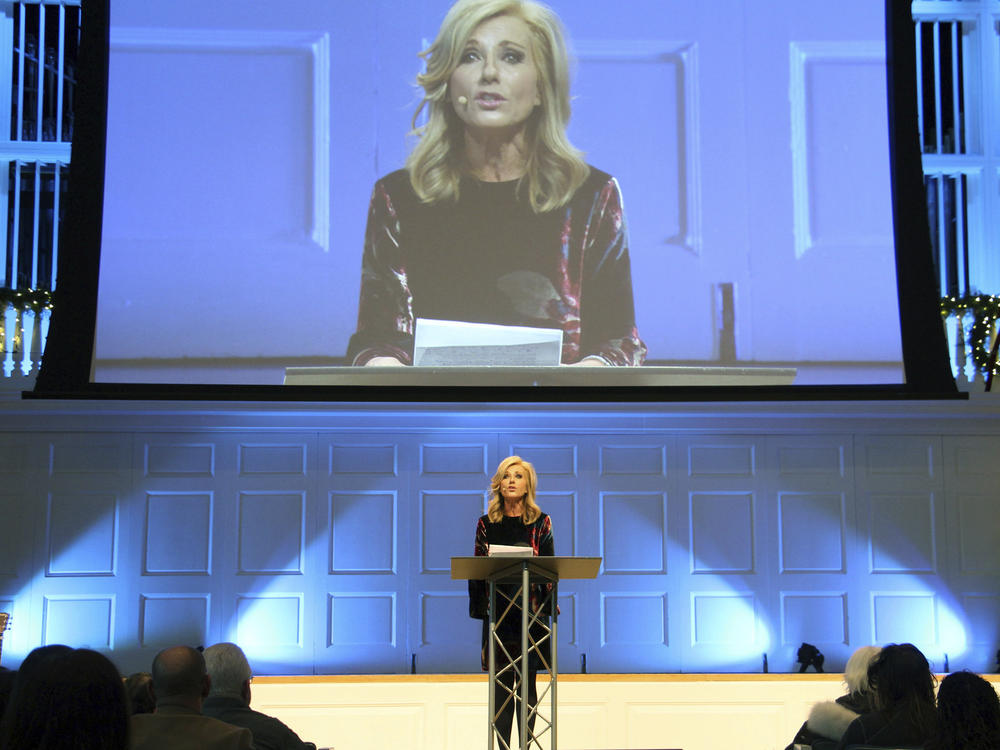Section Branding
Header Content
Prominent Evangelical Beth Moore Announces Split From Southern Baptists
Primary Content
Donald Trump may be out of the White House, but he continues to cause fractures within some conservative communities.
One of those is the Southern Baptist Convention, where Beth Moore, one of its most prominent women, this week left the church, having declared that she is "no longer a Southern Baptist."
Moore is an evangelical author and teacher of Bible studies who headlines cruises and speaks before huge audiences — her ministry reportedly had nearly $15 million in revenue in 2016. She attended a Baptist congregation starting in childhood and began her rise to prominence by sharing devotionals at the aerobics classes she taught at a Houston church. On Twitter, where she has nearly a million followers, Moore has pinned a tweet that says simply, "I just cannot recommend Jesus enough."
But as Trump rose to the presidency, Moore found herself aghast at the church's embrace of him and its stances on women.
"I am still a Baptist, but I can no longer identify with Southern Baptists," Moore said in an interview with Religion News Service last week. "I love so many Southern Baptist people, so many Southern Baptist churches, but I don't identify with some of the things in our heritage that haven't remained in the past."
In 2018, Moore wrote a blog post titled "A Letter to My Brothers" in which she described "attitudes among some key Christian leaders that smacked of misogyny, objectification and astonishing disesteem of women and it spread like wildfire." She had encountered what she called "one of the most demoralizing realizations of my adult life: Scripture was not the reason for the colossal disregard and disrespect of women among many of these men. It was only the excuse. Sin was the reason."
In 2019, Moore posted a tweet suggesting she would be preaching in a church on Mother's Day — though she didn't use the word "preach" — setting off an uproar in the conservative denomination about whether women should be permitted to preach.
She said she watched in amazement as that conversation immediately supplanted the discussion of a sexual abuse scandal that was rocking the church.
"We were in the middle of the biggest sexual abuse scandal that has ever hit our denomination," Moore told Religion News Service. "And suddenly, the most important thing to talk about was whether or not a woman could stand at the pulpit and give a message."
She felt increasingly unwelcome in the church after that, she said.
Jemar Tisby, president of The Witness, a Black Christian collective, told The New York Times that Moore's leaving would be "tectonic."
"Beth Moore has more influence and more cachet with Southern Baptists, especially white Southern Baptist women, than the vast majority of Southern Baptist pastors or other leaders. So her leaving is not just about one individual," Tisby said.
J.D. Greear, president of the Southern Baptist Convention, said many of its leaders "seem bent on pulling us apart."
"I have loved and appreciated Beth Moore's ministry and will continue to in the future. Personally, she has been an encouragement to me and I will always be grateful," he said in a statement posted to Twitter. "I am grieved anytime someone who believes in the inerrant Scripture, shares our values and desires to cooperate says that they do not feel at home in our convention."
Ed Stetzer, who formerly led the research division at Lifeway, which was until now Moore's publisher, says the Southern Baptist Convention "needs to have some hard conversations" about why Moore, as well as African American leaders, are leaving it.
Rachel Gulledge, whose husband is soon to be senior pastor in a Southern Baptist Church in Georgia, told The Washington Post that as a child, she watched Moore's Bible study videos with her mother.
"Beth Moore leaving is sad to me. But I don't blame her," Gulledge said. "For women, we probably lost one of our biggest voices."
Copyright 2021 NPR. To see more, visit https://www.npr.org.

